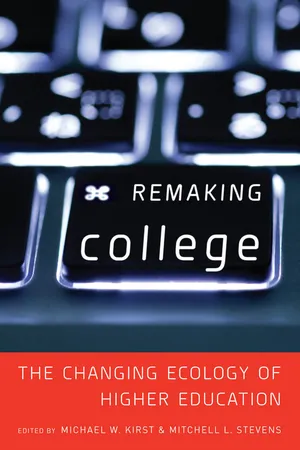
Remaking College
The Changing Ecology of Higher Education
- 336 pages
- English
- ePUB (mobile friendly)
- Available on iOS & Android
About this book
Between 1945 and 1990 the United States built the largest and most productive higher education system in world history. Over the last two decades, however, dramatic budget cuts to public academic services and skyrocketing tuition have made college completion more difficult for many. Nevertheless, the democratic promise of education and the global competition for educated workers mean ever growing demand.
Remaking College considers this changing context, arguing that a growing accountability revolution, the push for greater efficiency and productivity, and the explosion of online learning are changing the character of higher education.
Writing from a range of disciplines and professional backgrounds, the contributors each bring a unique perspective to the fate and future of U.S. higher education. By directing their focus to schools doing the lion's share of undergraduate instruction—community colleges, comprehensive public universities, and for-profit institutions—they imagine a future unencumbered by dominant notions of "traditional" students, linear models of achievement, and college as a four-year residential experience. The result is a collection rich with new tools for helping people make more informed decisions about college—for themselves, for their children, and for American society as a whole.
Frequently asked questions
- Essential is ideal for learners and professionals who enjoy exploring a wide range of subjects. Access the Essential Library with 800,000+ trusted titles and best-sellers across business, personal growth, and the humanities. Includes unlimited reading time and Standard Read Aloud voice.
- Complete: Perfect for advanced learners and researchers needing full, unrestricted access. Unlock 1.4M+ books across hundreds of subjects, including academic and specialized titles. The Complete Plan also includes advanced features like Premium Read Aloud and Research Assistant.
Please note we cannot support devices running on iOS 13 and Android 7 or earlier. Learn more about using the app.
Information
Table of contents
- Cover
- Copyright
- Title Page
- Contents
- Tables and Figures
- Acknowledgments
- Introduction: The Changing Ecology of U.S. Higher Education
- Part I: Understanding the Changing Ecology
- Part II: College and the Life Course
- Part III: Assessment and Governance in the Changing Ecology
- Part IV: A New Research Agenda
- References
- Index